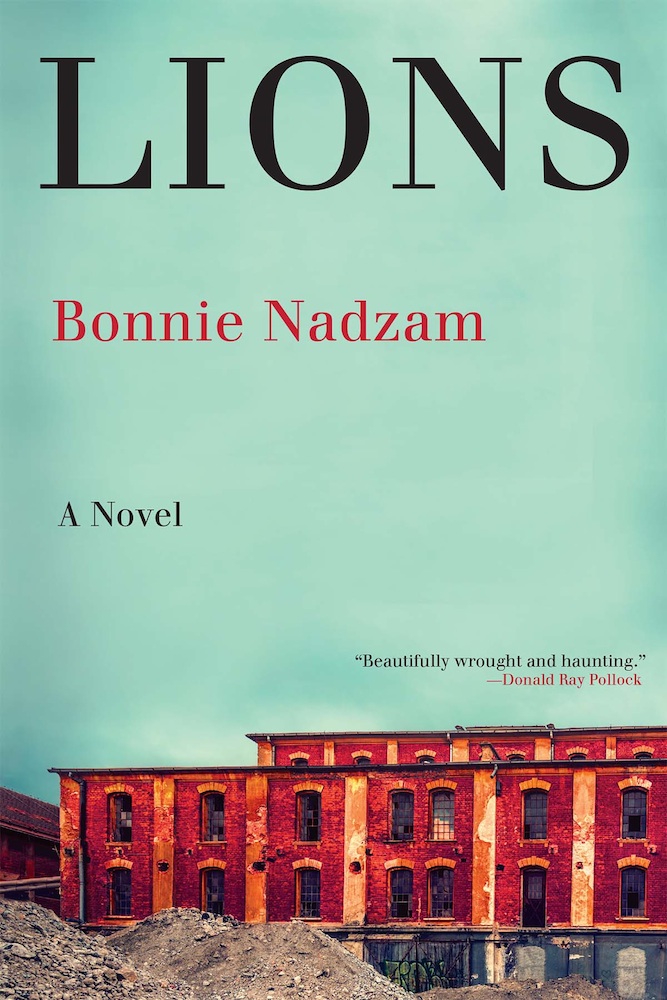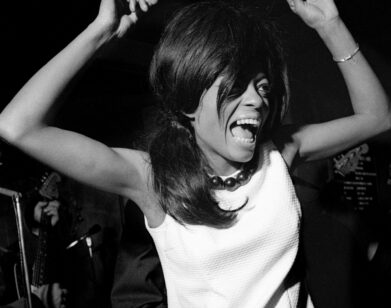Bonnie Nadzam’s Ghost Town

Bonnie Nadzam’s second novel Lions (Grove/Atlantic) is a haunting love letter to a dying Colorado town. In the dry American West, the last inhabitants of Lions live simple lives, shadowed with superstition and pioneer legends. When a strange, roaming man enters town one evening, he sets off a series of tragic events that change Lions and its residents forever.
Most affected is Gordon Walker, whose father dies of a heart attack shortly after the stranger disappears. Still a teenager, Gordon is transformed by his grief and the unusual legacy his father has left him. He begins to leave town for days at a time, never explaining where he goes. Not even his beautiful girlfriend, Leigh Ransom, who wants desperately to escape to college with him, can compete with his mysterious, newfound purpose.
Nadzam weaves ghosts, myths, longing, and an aching American landscape into a fascinating fable about the lengths we go to for the people we love. Tender, intense, and desperate for a better life, Nadzam’s characters are easy to relate to. We spoke with Nadzam about lost love, how we live our lives according to legends, dark culture, ghost towns, and the sublime.
ROYAL YOUNG: Why is lost love often more enchanting than the love you have?
BONNIE NADZAM: Leigh Ransom has a problem, which I think is a very American problem. It’s one I share to some extent: always wanting to improve your life. Endless becoming and always getting better as you age is your right as an American. Part of that is the idea of lost love. She’s such a shit. She’s so distracted that she turns her back on something true and real and doesn’t realize it until later. I didn’t intend her longing for lost love at the end to be symptomatic of the same pathology that led her to where she is.
YOUNG: I wonder how we know we are living our best lives. Is it when we stop wanting to?
NADZAM: I can’t speak for all of humanity. [laughs] In the book, when Gordon lets go of all of that seeking, he finds peace. Though a lot of early readers said he was totally crazy. They were like, “If that’s what peace looks like, I don’t want it.” I think if you’re maladjusted in a sick culture, doesn’t that mean you’re kind of okay?
YOUNG: His grief wakes him up to some amazing things, but also shuts the door on others.
NADZAM: Like what?
YOUNG: Human connection.
NADZAM: Yes, that seems true. Though, there is a profound human connection between Gordon and the character Boyd at the end, which sort of transcends the chatter of the world. They don’t even have to speak to each other. On a daily interactive level, yeah, he’s definitely lost. But on another level, not so much.
YOUNG: When we are confronted with someone who rejects a lot of what we’re ingrained to think is the right path it can be uncomfortable.
NADZAM: Exactly. Leigh does that. I put a lot of my negative qualities in her and I was surprised when people read the book and sided with her.
YOUNG: Well, the qualities that could be perceived as negative in her are so relatable too. She wants to escape a small town, she wants to explore the world, she wants to experience life in a larger way. We’ve all been taught that’s the way to live.
NADZAM: Yes. I was living in a small town, similar to Lions, and felt impregnated with these ideas from our culture about being entitled to certain lifestyles. I was surprised to find myself feeling this. I wanted to pull it out of the shadows and look at it in harsh light. Turns out it’s hard to see something we’re all so comfortable and familiar with.
YOUNG: There’s such a big place for myth in American history. There’s a whole legacy of larger than life legends that leak into our perception of ourselves.
NADZAM: That is really at the heart of what I was working at with the story. I’ve learned from works of art, books, stories, and TV how to be human. I’m not doing it consciously; it’s like I’m just acting [out] what being human is presented to me to be. It’s wondrous and dangerous, especially if you’re not aware it’s happening. Then you’re blindly acting out cultural values. I wanted to look at how an entire town interacts with stories in their lives and repeats those stories in their actions.
YOUNG: These myths become myths about ourselves; they are hard to separate from our actual lives and often we end up subconsciously living by the rules of myth or stories that are ingrained in us.
NADZAM: Yes—but there is a choice. You can break free of that. Especially when it’s a culture as destructive and dark as American culture. There has to be opportunity and hope.
YOUNG: Of course self-awareness is what lets us take the helm again.
NADZAM: Yes, it is, for me personally, a source of energy and also terror. There’s always more levels of self-aware you can be. How much is in my shadow that I can’t see? Will my loved ones and friends tell me?
YOUNG: We can’t be told.
NADZAM: We’re resistant to it. You see it when you see it.
YOUNG: We walk around in fear that people are not telling us about the problematic ways we act but also terrified they will.
NADZAM: And if they do, we get angry and defensive and turn away: “I don’t have room for that person in my life because they’re negative.” The ego is always shape shifting to protect itself.
YOUNG: Let’s talk about ghost towns and the idea of being haunted.
NADZAM: The first line about seeing ghosts everywhere didn’t start out meaning that. When I first wrote it, I was thinking about when I was a child and I first became aware of how the world around me always seemed to be in conversation. I walked around all the time with a hair up on the back of my neck. It seemed everything was imbued with this powerful spirit, which was in communication with me. It was mysterious.
If you drive through the American West you will see entire towns ruined. You think of everyone who lived there and left their clothes hanging in the closet—they’re all dead. It makes you think of your own death in a way that makes existence more charged.
YOUNG: When you say charged, it’s a positive feeling?
NADZAM: Yes, because it’s energy. This is a bit clichéd, but life wouldn’t as precious if we didn’t know it was going to end. It’s a feeling of the sublime.
LIONS IS OUT NOW.






